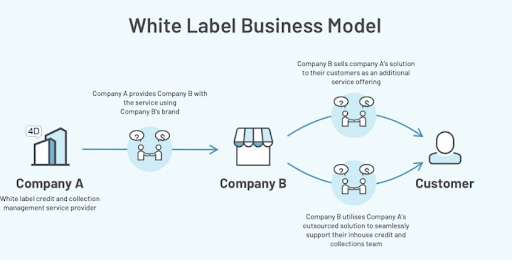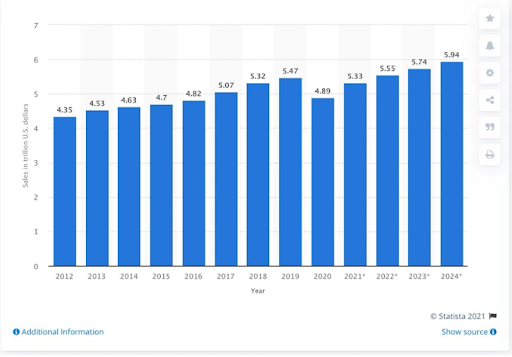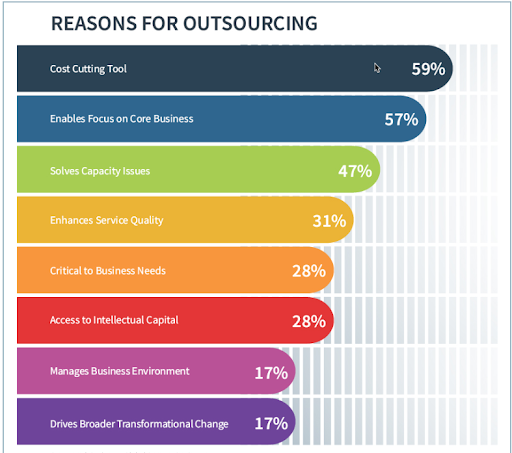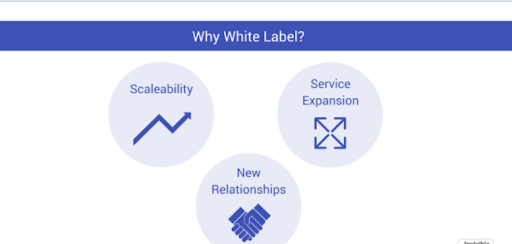An Ultimate Guide to Building White Label Partnerships in 2022
- Kevin Oskow
- July 6, 2022
- 12 Minute Read

The “like-for-like swap” strategy still dominates the marketplace in the age of data and technology. Businesses are offering their services to their customers just as they are. In this post, you will learn about different types of white label partnerships, their benefits, and how to create a partnership between two independent companies successfully. You know how to create partnerships that can potentially improve the company’s sales or product visibility by 20% or even more.
The white label services industry is booming. In 2022, it is expected that the market value will grow and expand further by 2030. The profit generated by the industry can be explained by the current tendency to introduce platforms and software that facilitate human interaction and mutual assistance between companies and their clients.
What is a White Label Partnership?
White label partnerships are a great way to grow your business. They allow you to expand your reach without putting any extra effort into building out the infrastructure and support that comes with it.

But if you’re going to build them, you need to make sure you’re doing it right.
The three pillars of a white label partnership:
Marketing
The brand is responsible for creating the right messaging, content, and overall product positioning. They need to be able to tell a compelling story that shows their potential partners how they can add value to their portfolio.
You have to have a good marketing strategy before you even start looking for partners. If they don’t know who you are, they won’t want to partner with you!
Sales
The company building a white label partnership needs an extensive sales team with deep expertise in their vertical or space. This requires extensive knowledge of the target market and how they solve problems within the industry.
You can’t just throw up an ad and expect people to come flocking in. You have to have salespeople on board who can close the deal. They need training and support from their managers and the marketing team if possible!
Technology
If your company doesn’t have the technology, you’re out of luck. Building a white label partnership requires technology, whether your proprietary platform or software (SaaS).
The technology side is often overlooked when people talk about white label partnerships, but it’s just as important! If your tech isn’t up-to-date, your partners will be hesitant about bringing their customers over because they won’t want them to use outdated software or hardware!
Why must you focus on White Label Partnerships?
Partnering with companies and sharing resources to gain more business is more popular than ever. It’s one of the most effective ways for businesses to expand their reach without spending money on extra resources.
This strategy has been used by many successful entrepreneurs who have built strong brands through partnerships.

A white label partner greatly benefits the partnership as they can share their resources, experience and expertise while also gaining new customers and revenue streams.
For example, suppose you have a small business but want to expand it into other countries. Partnering with companies that already operate in those countries can help you with this expansion process. In return, they will also gain access to your existing customers and revenue streams which means that both parties benefit from this type of partnership.
Partnerships Are Essential To Grow
The world’s fastest-growing brands have built a network of trusted partners. They’re also the ones who can scale quickly and adapt to new opportunities faster than their competitors.
For instance, Amazon has partnered with several brands like Wal-Mart, Target, and Whole Foods to become the go-to place for online shopping. Similarly, Uber has partnered with Starbucks by offering passengers free rides to coffee shops. These partnerships help both brands expand their reach.
Flexibility and scalability of strategy
With white label partnerships, you don’t need to build an entire product or service from scratch. Instead, you can focus on what makes your brand unique and valuable while leveraging someone else’s expertise in making the product or service. This way, you can scale up quickly without investing tons of resources into developing products and services that might not appeal to customers anyway.
This means that if you want to spend more time building your brand with new products, you can do so while still generating revenue through white label partnerships. The same is true if you want to scale down temporarily while improving existing processes or infrastructure within your company and then scale back up once these improvements have been made.
Clarity and Transparency of goals and expectations
If there’s one thing that we love about a white label partner, they’re clear about their goals from the beginning. This means that there is no guessing or miscommunication between partners because everyone knows what their role will be from day one!
Once you don’t have clarity on what your goals are or what you want to achieve, this might lead to the failure of the partnership because both parties will not be clear about what they want from each other. Often, people fail to understand each other, which leads to mistrust between them, resulting in the breaking up of the partnership.
Streamlined operations and processes
WLPs allow you to focus on your core competence while maintaining a streamlined approach to the market. This will enable you to focus on most things, thereby reducing costs and improving efficiency.
Most of these businesses have already figured out how to streamline their operations and processes to focus more on their core competencies. This means faster time-to-market for new products, increased scalability, lower costs, etc.
How to find the right white-label partner for your business?
White label partnerships are great opportunities to solve problems and reach new customers. The problem is that it’s hard to find the right white-label partner for your business.
That’s why it’s crucial to choose the right white label partner for your business.

Here are some tips on how to find the right white-label partner for your business:
1) Know what you want from a white-label partnership
If you’re looking for a white-label partner, knowing exactly what you want from this relationship is essential. Do you want to sell in one specific country? Or do you want to sell across multiple countries? Do you want exclusive rights over certain products? Or do you want someone else to handle logistics and marketing while leaving the rest of the work up to yourself?
Think about how much time and energy your business needs right now, then look for partners who can provide services that match those needs.
2) Define your ideal partner and discover their needs
First, you need to define your perfect partner.
What kind of company do you want to partner with? What is their expertise? What service do they offer? How much revenue are they making from their partners? Do they have any strategic alliances with other companies? What kind of experience do they have in this industry?
Once you know what type of partner you want to work with (e.g., manufacturing company or distribution channel), it becomes easier to search for potential candidates through social media channels like LinkedIn or Facebook groups.
3) Find qualified partners based on industry, geography and category expertise
Before you start searching for a white-label partner, it’s essential to know what kind of partnership you want. Do you want to sell products and services, or do you want to build a network?
If you’re looking to build a network, you can find the right partners in specific industries and geographies based on their expertise. For example, if you’re an Australian cosmetics brand that wants to expand its reach in Asia, look for partners with experience in that region. These partnerships can help brands grow their brands globally at an affordable cost.
4) Leverage technology to streamline processes
Make sure you’re looking at a company with the infrastructure and workforce to support your business needs. If they don’t have the resources, it will be difficult for them to provide the level of service that you need.
You should also consider how well they understand your industry and their reputation and experience in providing solutions for similar businesses. These areas can help you evaluate whether or not this is the right partner for you.
Top White Label Partnership Models
1. E-commerce store
White label partnerships are a great way to get your name out there. You can create your brand and sell products online or create a partnership with an existing company with an established audience and customer base.
The most popular way to build a white label partnership is by selling your products on an e-commerce store. This is the easiest way to get started because it doesn’t require any technical knowledge or skill. With this model, you need to find a good place to sell your product and share your sales link with other merchants.
2. Product co-creation
Product co-creation is the most common type of white label partnership in the digital age — it’s when two companies work together to create an exclusive product that’s sold under one brand name only. Both companies will own the product, but the company’s brand that contributed most to the development or marketing will be used as the leading brand.
For example, Amazon has been known to work with brands like Hasbro and Mattel to create exclusive products for its marketplace. Hasbro gets access to Amazon’s customer base, while Amazon gets access to Hasbro’s intellectual property. The result is a new product that neither company would have been able to develop on its own.
3. Reseller model
The reseller model involves selling a product or service under your brand while allowing the supplier company to maintain ownership and control of the product or service. The supplier company sets up all aspects of the distribution channel and handles customer support requests. You take care of sales, marketing, logistics and other administrative tasks. This is typically used for B2B products or services that require significant investment in sales collateral (websites).
This is the most basic type of partnership. A reseller sells your products or services directly to customers under their name and brand without any input from you or your company. This is often called “white labelling” because it allows you to develop a product or service without worrying about marketing or sales. You provide the product or service and let your partners do all the legwork!
10 Tips to Build a Successful White Label Partnership
1. Determine your niche
Before you begin searching for potential partners, it’s essential to figure out precisely what type of partner you want to work with. This will help you narrow down your search results and make it easier to find the right partner for your business model.
2. Figure out your budget
Before you even start looking for potential partners, it’s essential to determine how much money you have available for this venture. You want the partnership to be mutually beneficial, so make sure that there are enough funds available for both parties involved to provide value to each other’s businesses.
3. Choose the correct type of partnership
White label partnerships come in various forms. You can have a full or partial white label partnership with another brand or company, which means you can use their name and logo for your products or services and vice versa. There are also hybrid models where the two companies will only collaborate on a particular development or service aspect (e.g., marketing).
4. Test before investing too much time and money
Before committing to anything, start contacting several potential partners and testing their services first-hand. If possible, try out their software or ask them for advice on how they would handle your specific goals and challenges before committing.
5. Define success criteria for your white label partnership
Once you have set specific goals, it’s easier to determine how much time and money should be invested into each partner. You will also be able to develop an actionable plan that keeps you focused on achieving these goals instead of getting distracted by other opportunities or distractions.
6. Put an SLA (service-level agreement) in place to lay out the terms of the white label partnership
Put an SLA (service-level agreement) in place to lay out the terms of the white label client. This includes how much time will be spent on building the partner’s brand, what type of support they can expect from you and how long the partnership will last.
7. Create a playbook for onboarding new partners
Your business can’t grow without new partners to bring on board. A solid onboarding process will help you streamline the process for both you and your future partners. The playbook of white label branding includes elements like an onboarding checklist, due diligence questionnaire, legal agreements and product training.
8. Establish a communication plan covering the first 90 days of the white label partnership
It’s essential to ensure that both sides are kept in the loop about what’s going on with their respective companies. This ensures that everyone is informed about their progress and makes it easier for both sides to collaborate.
9. Nail down success metrics and reporting parameters for your white label partnership
The most critical white label tools include determining when building a white label partnership is what you’re going to measure, how you’re going to measure it, and who will report on it.
For example, if you’re looking at a campaign that provides some service or product that needs to be tracked through the process to completion, then the partner will need to report on this information regularly.
10. Measure and optimize the performance of your white label partnership over time.
The first step in building a successful white label partnership is understanding how well your partners are performing. You can use tools like Google Analytics, Salesforce, or other data collection tools to understand how customers interact with your brand and your partners’ brands. Integrating Google Analytics with Salesforce is another efficient way to gather in-depth performance reports. You may also want to consider using surveys or interviews with customers to get feedback on how they feel about both brands.
Benefits of White Labeling

White label partners can help you scale your business and expand into new markets. White label partnerships are an excellent solution for growing your brand and increasing brand awareness.
Here are the benefits of white labeling:
1. Access to New Customers
By partnering with another brand, you can open yourself up to new markets and customers that you may not have been able to reach otherwise. By leveraging each other’s resources, teams, and networks, you can benefit significantly from the partnership and scale up with the white label products.
2. Cross-Selling Opportunities
White label partnerships can help you reach new customers who wouldn’t otherwise have known about your white label products or services. They also give you access to a larger marketplace at no cost to you.
3. Increased revenue
By allowing someone else to manage their sales and marketing efforts, you’ll free up time and resources to focus on improving your core offering and growing your business further. You also won’t have to spend money on advertising or other marketing campaigns as these will be handled by your partner company instead.
4. Improved margins
When you sell your white label products through a wholesale distribution channel, you have to give up the margin on the sale. In other words, for every dollar you make on one of your products, you will make less than a dollar on that same product when it’s sold through a retail distribution channel. This is because retailers typically take 50-60% of the sale price as their margin.
5. Reduced risk
In a white label partnership, you’re effectively outsourcing your marketing. You get access to the partner’s existing resources, such as their database and established relationships with prospects. This reduces your risk because you don’t have to invest in developing these things yourself.
Challenges of a White Label Partnership
1. Sales cycle
One of the biggest challenges with a white label partnership is the extended sales cycle — especially if your partner doesn’t have the same product or service offering as your company.
This is because it can take time for customers to understand what value your company offers and why they should buy from you rather than directly from your partner.
2. Development of expertise
While it may seem like you’re saving time by outsourcing some of your work, this approach often requires more time and money because you need to develop expertise in other industries before working with them.
3.No control over pricing
Another challenge with a white label partnership is that it often involves sharing control over pricing strategy with another company (which is something that many e-commerce businesses aren’t comfortable with).
4. Lack of visibility into customer data
A significant challenge is the lack of visibility into customer data. In most cases, you won’t be able to see who has bought your products through the other company — which means you won’t know how well they perform or whether there are any issues related to customer satisfaction.
5. No control over fulfillment and delivery times
One of the biggest challenges with white label partnerships is that you have no control over the delivery and fulfillment times. You can’t guarantee when your partner will ship out their products, so you can’t be sure when they will arrive at your customers’ homes. This creates a problem for your customers, who may receive their items very late or not.
Wrapping Up
The best white label companies are the ones that have a fundamental value proposition to offer. In other words, you have to have something that sets you apart from everyone else. It can be marketing, distribution, technology, or something else entirely. Find your thing, and go with it. Good luck!

Thank you for submitting the details!
We will keep your information safe. Feel free to contact us with any questions at hello@uplers.com
Please check your email for next steps shared by Robert.



















